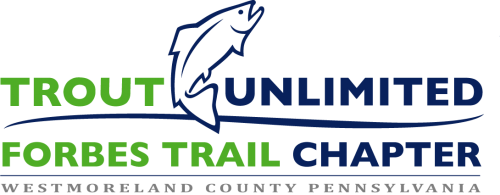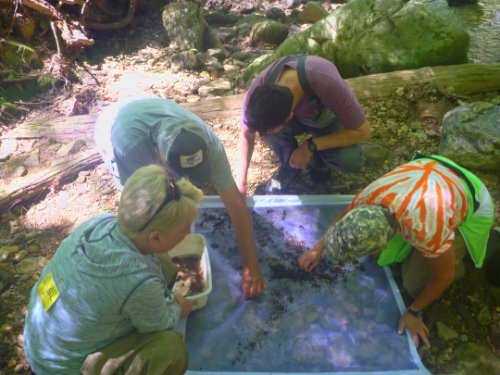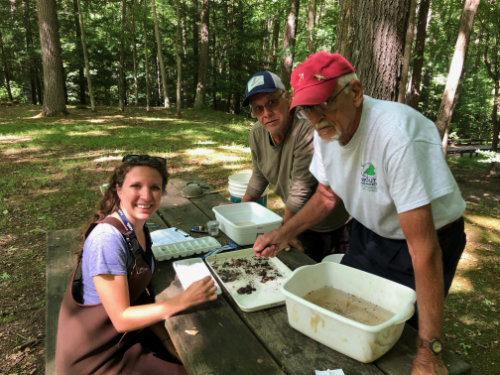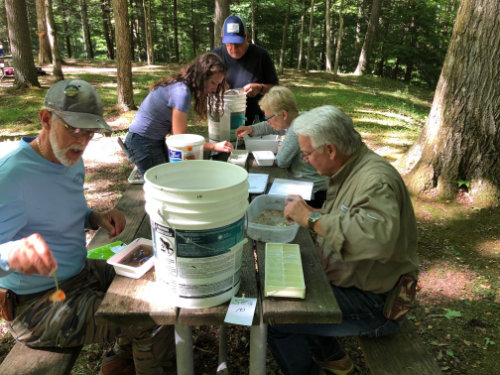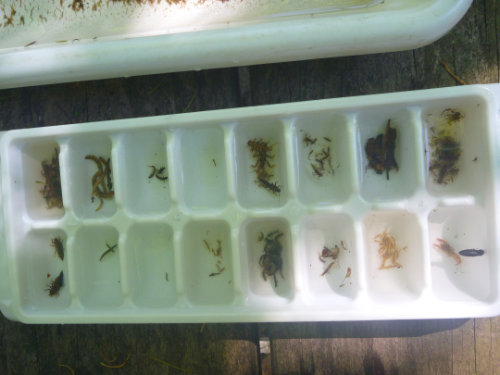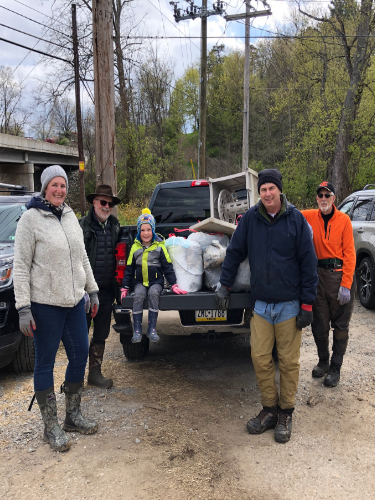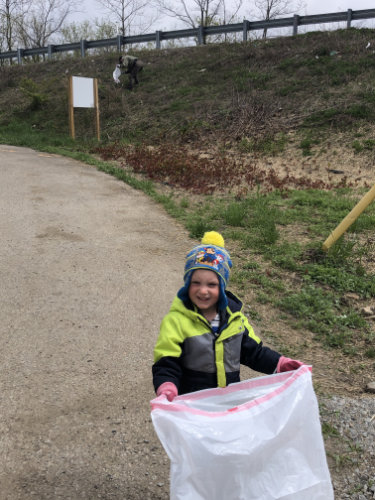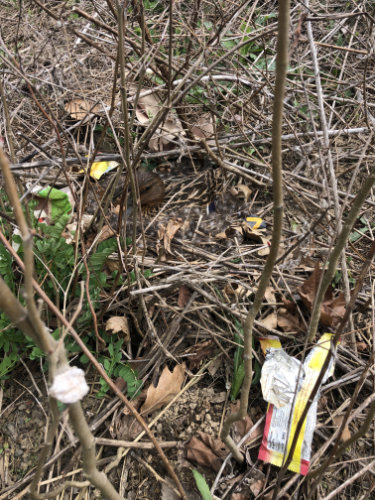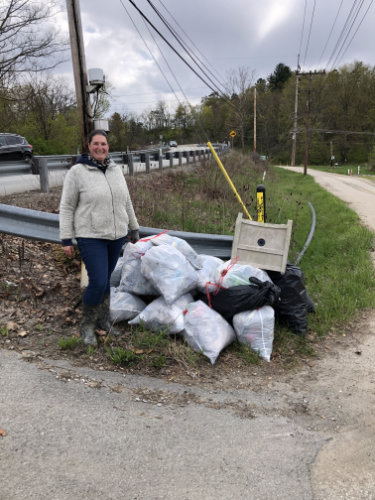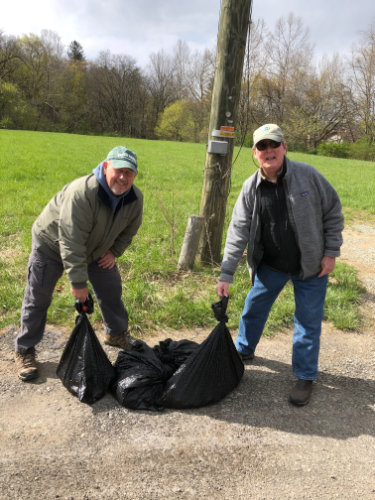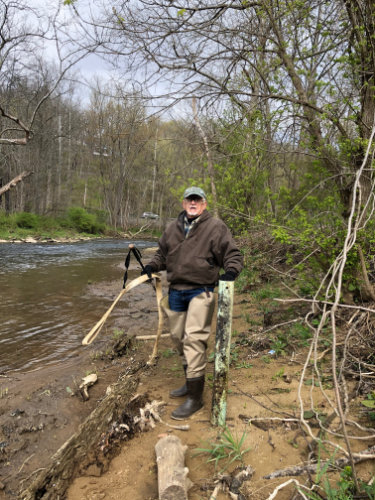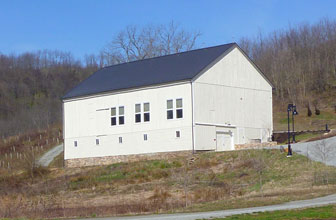Category: Conservation
Linn Run Cold Water Conservation Plan Update
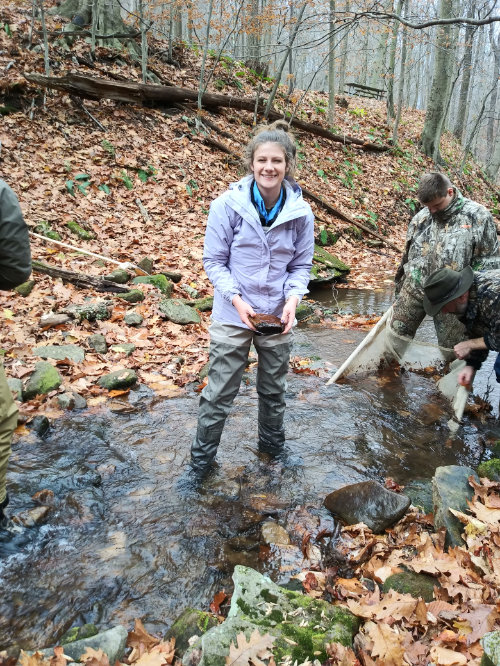
Forbes Trail members and local volunteers wrapped up three days of water quality sampling and macroinvertebrate (trout bugs) studies on Linn Run and its tributaries in mid-November. They enjoyed beautiful weather for two of the days. But, the last day of macro, they had to deal with rain, falling temperatures and working under a dark pavilion to sort and identify the bugs. All in all, they collected a large quantity and wide assortment of bugs and the water quality in the stream is looking good.
Andrea Kautz from Powdermill Nature Reserve and Josh Penatzer from Loyalhanna Watershed Association were the bug experts assisting volunteers with sorting and making correct identifications. Strict protocols have to be followed for collecting the bugs from the stream, including the length of stream sampled, how long to kick the stream rocks and debris, and specific mesh nets to be used. The sorting and identification is a very tedious and eye-straining activity. Many of the bugs must be picked from leaf packs with tweezers.
Water quality samples were first analyzed stream-side by TU members for a number of parameters including pH, alkalinity and dissolved oxygen. Duplicate samples are being analyzed at St. Vincent College for additional parameters using a Microwave Plasma Atomic Emission Spectrophotometer. Analyses there include nitrates, phosphates and metals. Collectively the results will tell the overall health of the stream and its ability to support wild trout.
We thank all of the TU members and volunteers who gave of their time and talents to complete this portion of the study. We’ve had several volunteers from the PA Master Naturalist program offer their skills and expertise over the past year. We offer a special thank you to Elizabeth Bruner who is a 4-H and TU member and homeschooled senior from Blairsville, and Luke Sanner, 4-H member and sophomore at Hempfield High School for their participation. We are pleased to see the younger generation taking such an interest in coldwater conservation projects.
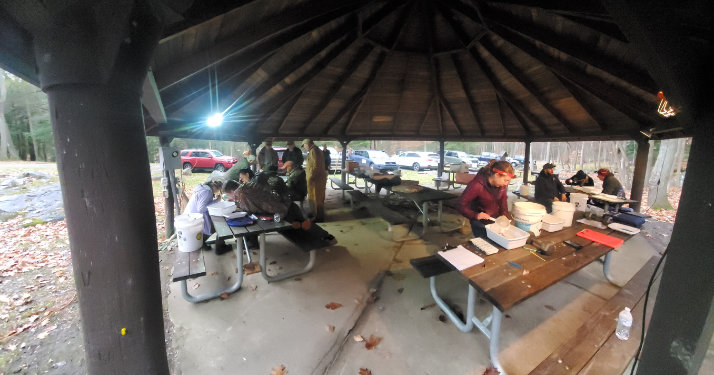
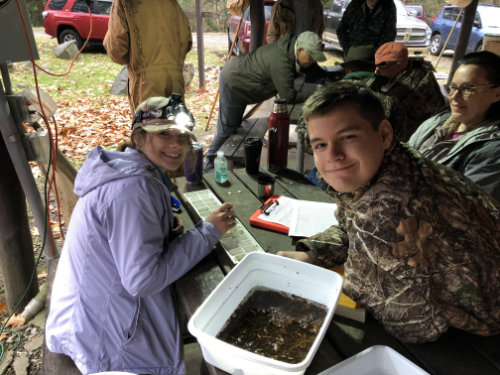
Woolly Adelgid Educational Video
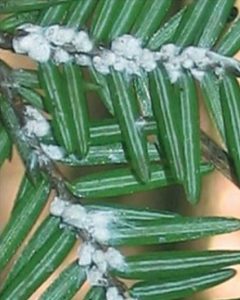
The Woolly Adelgid is an invasive insect pest that threatens and can kill our state tree, the hemlock. Hemlock trees go hand-in-hand with brook trout streams in Pennsylvania.
FTTU’s Ron Miller has put together an excellent video that explains it all and what’s being done to save our hemlocks locally at Linn Run State Park.
Click HERE to see the video.
TU Helps Treat Hemlocks for Invasive Insects
Volunteers from Forbes Trail responded to a request for assistance from Linn Run State Park Manager, Corey Snyder, to treat hemlock trees for an invasive insect. The hemlock woolly adelgid (HWA) has been devastating hemlocks forests in the eastern U.S. for several decades. Once they get a foothold, they spread rapidly and within just a few years, a stand of 200-hundred-year-old hemlocks are dead. The insect, believed to have arrived here in the New England and Mid-Atlantic states from Asia around 1920, is spreading quickly through Pennsylvania threatening our state tree.
Of particular concern to FTTU is the effect it could have on our streams. The canopy of hemlocks along Linn Run and its tributaries could be wiped out, allowing the sun to penetrate and warm the stream. Linn Run is classified as a High Quality Coldwater Trout Stream by the PA Fish and Boat Commission. That classification, and of course the fishery and supporting aquatic insect population, are at risk.
One means of control is with predator beetles. But it would take years to establish a population that could naturally control the HWA. On October 14, FTTU volunteers assisted park staff in treating 9,000 inches (measured diameters) of hemlock trees by injecting the insecticide Xytect in the ground at the base of the tree to be absorbed by the root system. Foresters from the Bureau of State Forests measured the diameter of the hemlocks to determine the appropriate dose, then had volunteers inject the chemical into the ground around the base of the trees.
Volunteers were trained on site and told how to protect themselves while using the chemicals. The chemical works systemically by the tree absorbing it through its root system up to the branches and needles where the HWA sucks out the sap. This is a very expensive and labor-intensive operation. But our state tree and historic stands of hemlocks are at stake. Coupled with the impact of warming weather from climate change, our coldwater streams are at high risk. FTTU wants to help do its part. We may be calling for more volunteers in 2022. Corey Snyder expressed the Park’s gratitude for TU’s quick response to this matter. “We couldn’t have completed it this year without your group’s help!”

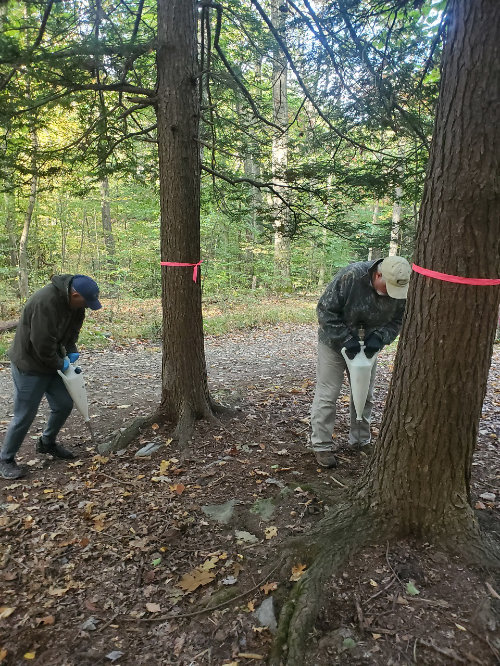
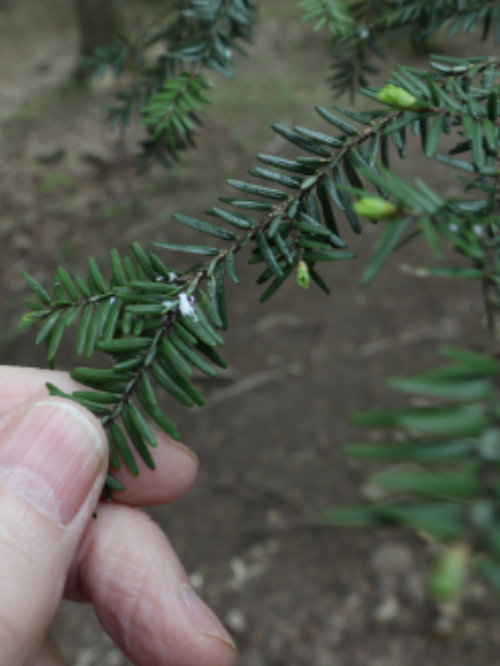
Linn Run Conservation Plan Work Continues with Macro Study
On Wednesday, June 16, FTTU volunteers gathered at the Grove Run Picnic area in Linn Run State Park to do a comprehensive aquatic macroinvertebrate collection and study of Linn Run and its tributaries. Andrea Kautz, Research Entomologist at the Powdermill Nature Reserve, and Josh Penatzer, Project Manager with the Loyalhanna Watershed Association, were the professionals who supervised the study. Previously, Andrea conducted a macro identification training session for volunteers via zoom, and both Andrea and Josh demonstrated the use of kick nets, explained the collection protocol, and oversaw the identification, sorting and scoring process on site. FTTU members with previous experience in macro collection led teams that carried out the kick net collection at 11 different sites within the watershed. Each site had at least 200 organisms captured. The samples were collected in buckets and brought back to the Grove Run Picnic Area where they were counted and sorted to the Genus level and then returned to the stream. All this work was carried out between 1:00 pm and 7:00 pm thanks to the great response we had from volunteers and Andrea and Josh’s guidance.
The numbers and types of macroinvertebrates inhabiting a stream are great indicators of stream health particularly the “high quality” Genus’s of mayflies, stoneflies and caddis flies.
The final report for the Linn Run Coldwater Conservation Plan will be produced in about one year. The study is to determine the overall health of Linn Run and the fishery. Next step, based on the information collected, is to determine if there are potential remediation projects we can undertake that might improve stream health and trout habitat.
Earth Day Litter Sweep
In conjunction with the Loyalhanna Watershed Association, FTTU celebrated Earth Day on Thursday, April 22, by holding a litter clean-up day on two sections of Loyalhanna Creek. The Latrobe crew worked from the 982 bridge to about 100 yards downstream of the Mission Road Bridge (Murphy’s Bridge) and collected 15 bags of trash and some large junk items. This area had not been done in quite some time. We had 4 (and a half!) volunteers work this area including Angela Schultheis, Everett Schultheis, Ron Miller, Ed Barger and Scott Minster.
The Ligonier volunteers worked from the 711 bridge to the Two Mile Run bridge and filled 9 trash bags along with some large junk items. This area was last done in 2019 since we had to cancel last year’s clean-up. The Ligonier crew consisted of Joe Billota, Milt Claney, Rod Cross, Monty Murty, Larry Myers and Bonnie Robinson.
The L.W.A. provided gloves and trash bags and Penn Dot will pick up the piles of trash. Thanks to all who participated!
FTTU Meets with Yough Riverkeeper
Forbes Trail Chapter TU invited Eric Harder as a guest presenter at one of its recent meetings. The link you see will take you to that presentation which was recorded on Zoom.
Many of us enjoy the Yough River and its tributaries for fishing, rafting, kayaking and boating. And of course many of you are familiar with the Yough River Trail, part of the Great Allegheny Passage that parallel’s the river from Confluence to McKeesport. The Yough River stretches from beyond Deep Creek Lake to where it enters the Monongahela River in McKeesport. It is 134 miles long and stretches through WV, MD and PA.
Eric Harder, AKA the “Youghiogheny Riverkeeper” with Mountain Watershed Association, discusses the Association’s advocacy, conservation, and outreach initiatives within the Laurel Highlands region. Specifically, Eric covers water quality concerns within the Yough Watershed and ways residents can help “Defend the Yough”!
Trout Unlimited works closely with watershed organizations like MWA across the Commonwealth and across the US to help preserve and restore our precious coldwater fisheries.
If your organization is interested in having Eric make a similar presentation, contact Eric at eric@mtwatershed.com or 724-455-4200 2#
You can view the entire meeting on Facebook FTTU Youghriverkeeper Meeting.
